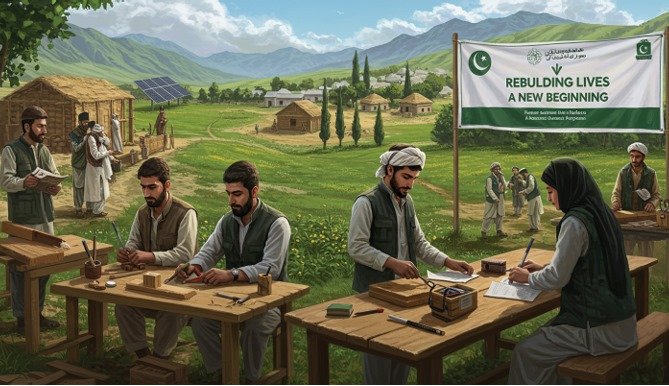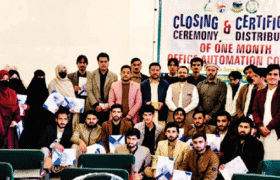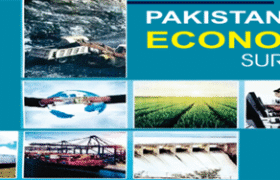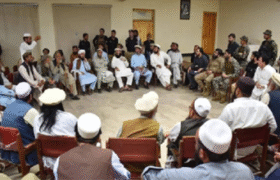NOOR-E-HIRA
Khyber Pakhtunkhwa (KP), a province in northwestern Pakistan, has long stood at the frontlines of conflict. For many years, the region was deeply affected by terrorism, militancy, and instability. Thousands of lives were lost, homes destroyed, and communities torn apart. However, in recent years, there has been a growing effort to move forward and rebuild. By focusing on sustainable development, inclusive governance, and community-driven initiatives, KP has a real opportunity to break the cycle of extremism and emerge as a model for post-conflict reconstruction in Pakistan.
The impact of extremism on KP cannot be overstated. Entire towns were overrun by militant groups such as the Fitna-Al-Khawarij (FAK), and military operations were required to reclaim these areas. While the security forces successfully cleared many regions, the root causes of extremism still persist. Unemployment, poverty, lack of education, and weak local governance have all contributed to pushing vulnerable individuals toward radicalideologies. Unless these underlying issues are addressed, the threat of extremism may resurface.
This is where sustainable development becomes essential. Rather than relying on temporary fixes, KP needs long-term, community-centered solutions. One of the most critical areas is investment in education. When young people have access to quality learning opportunities, they are more likely to build productive futures and less likely to be swayed by extremist influences. Over the past decade, there have been concerted efforts to rebuild schools and promote female education across KP. NGOs and government programs have helped raise awareness and provide school supplies, scholarships, and transportation for students in remote areas.
Yet education alone is not enough. The local economy must also be revitalized. Many young men in KP are unemployed, making them easy targets for extremist recruiters. Sustainable job creation is vital for restoring trust and giving people a stake in peace. This can be achieved through vocational training programs that equip youth with practical skills such as carpentry, plumbing, IT, and tailoring. Organizations like the Technical Education and Vocational Training Authority (TEVTA) are expanding their reach in KP, especially in the tribal districts, to provide these opportunities.

Agriculture, a traditional livelihood in KP, also holds promise for sustainable development. Many farmers lack access to modern tools and knowledge of improved farming methods. Introducing practices such as drip irrigation, organic farming, and crop rotation can not only enhance productivity but also protect the environment. Community-based farming cooperatives can help farmers share resources, access markets, and obtain fair prices, thus building economic stability.
Infrastructure development remains another crucial priority. Roads, bridges, electricity, and internet connectivity are essential to integrate remote areas with the rest of the country. After years of conflict, many parts of KP still suffer from inadequate infrastructure. Without roads, children cannot reach schools, farmers cannot access markets, and patients cannot get to hospitals. With support from international donors, the government has begun rebuilding infrastructure in affected regions. These investments go beyond concrete and steel—they are about reconnecting communities and restoring a sense of normalcy and hope.
However, rebuilding KP is not just about physical development. Inclusive governance is fundamental. For decades, the people of KP, particularly those in the former Federally Administered Tribal Areas (FATA) felt excluded from decision-making processes. Since the merger of FATA into KP in 2018, legal, political, and administrative reforms have been introduced, but progress remains slow. Genuine change requires giving local communities a meaningful voice in shaping the policies that affect their lives.
Empowering local governments and including community leaders, especially women, youth, and minorities, in governance structures is essential. Mechanisms such as town hall meetings, village councils, and participatory planning sessions can help ensure that development is aligned with actual community needs. When people feel heard and respected, they are more likely to contribute positively to peace and progress.Technology can also play a valuable role in KP’s transformation. Mobile applications and digital platforms can disseminate job information, provide online education, and connect citizens with essential government services. In Peshawar, for instance, young entrepreneurs have launched initiatives to teach coding and digital skills, enabling youth to work remotely for clients worldwide. This not only opens new economic avenues but also connects KP with the global digital economy.
Security must remain part of this broader sustainable approach. While the military has played its role, it is now time for local police and law enforcement to take the lead. Community policing where officers build relationships with residents can foster trust and help identify early warning signs of radicalization. Proactive engagement, rather than reactive enforcement, is key to preventing future conflict.
Women’s empowerment is another cornerstone of long-term peace. Women in KP have traditionally faced barriers such as limited mobility and restricted access to education and resources. Yet, they have often been among the most vocal and active supporters of peace. Many women-led organizations are working to educate girls, assist widows, and train female entrepreneurs. Supporting these efforts uplifts not only women but entire families and communities.
Promoting cultural heritage is equally important. KP boasts a rich history, diverse languages, and vibrant traditions. Reviving local crafts, music, poetry, and festivals can foster pride and unity. Cultural expression offers a powerful alternative to the narratives of hate and division and strengthens social cohesion.
Breaking the cycle of extremism is no easy task. It requires time, patience, and sustained effort. But the people of KP are resilient. They have endured years of hardship and now seek to rebuild their lives with dignity. By prioritizing sustainable development, inclusive governance, and community-driven solutions, KP has the potential to become a beacon of hope for post-conflict recovery—not just for itself, but for all of Pakistan. Rebuilding is not only about infrastructure; it is about restoring hope. And in doing so, KP can lead the way toward a more peaceful and prosperous future.





